Corporate Responsibility and Ethics - Woolworths Business Report
VerifiedAdded on 2023/06/10
|11
|2363
|150
AI Summary
This report sheds light on the corporate social responsibilities of Woolworths and its initiatives towards corporate social responsibilities (CSR). It describes Carroll's Model of CSR and Wartrick and Cochrane's Typology, key stakeholders, environment, human rights, governance, and company's record on philanthropy.
Contribute Materials
Your contribution can guide someone’s learning journey. Share your
documents today.
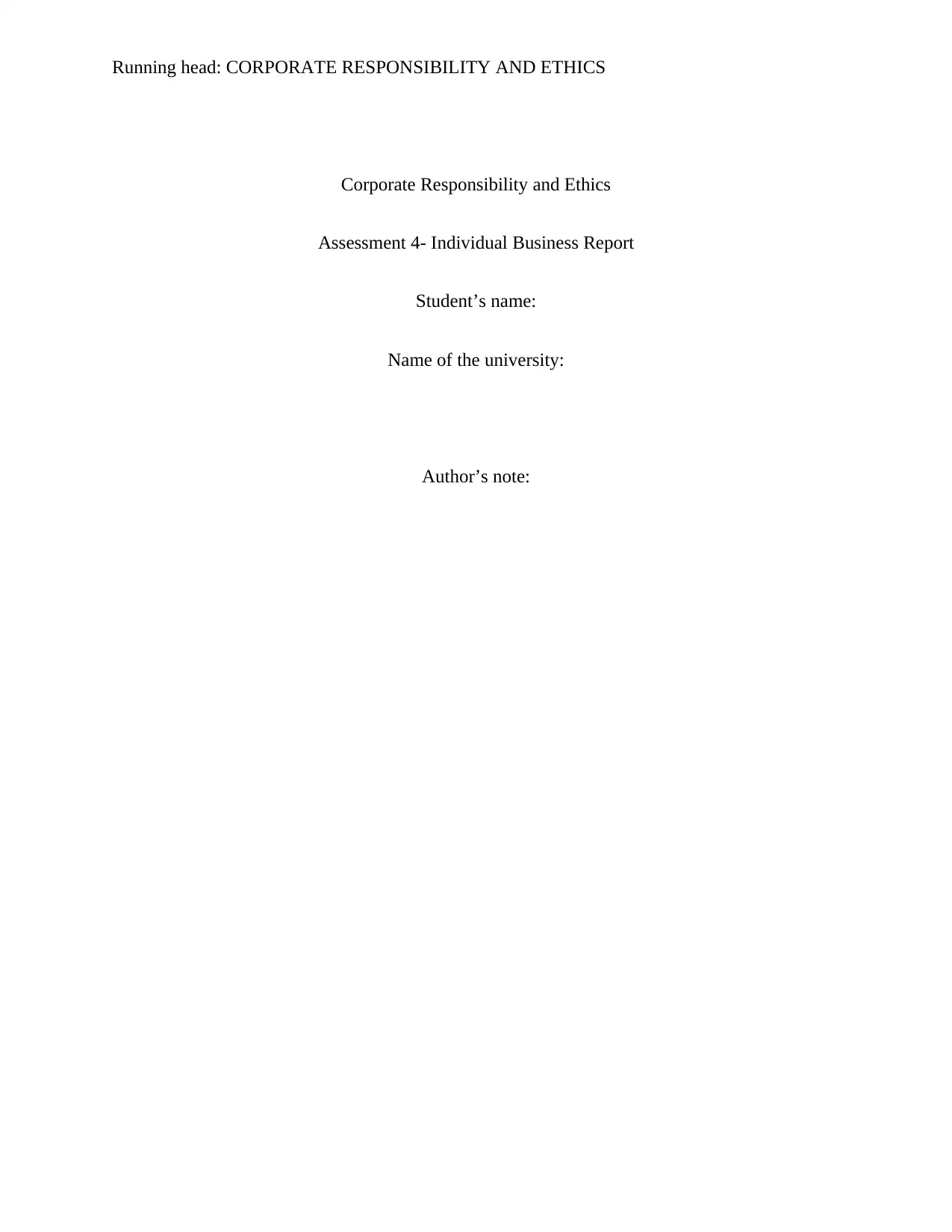
Running head: CORPORATE RESPONSIBILITY AND ETHICS
Corporate Responsibility and Ethics
Assessment 4- Individual Business Report
Student’s name:
Name of the university:
Author’s note:
Corporate Responsibility and Ethics
Assessment 4- Individual Business Report
Student’s name:
Name of the university:
Author’s note:
Secure Best Marks with AI Grader
Need help grading? Try our AI Grader for instant feedback on your assignments.
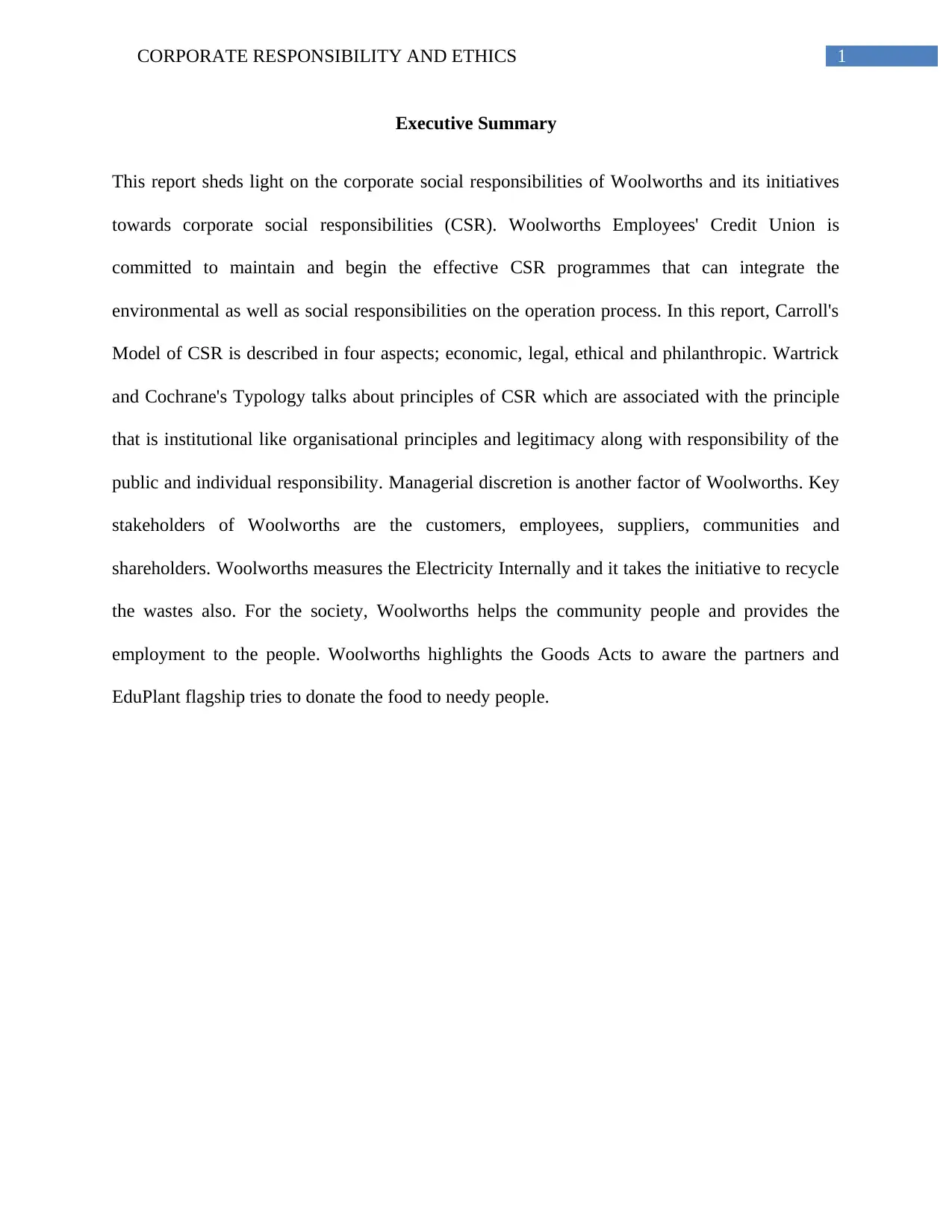
1CORPORATE RESPONSIBILITY AND ETHICS
Executive Summary
This report sheds light on the corporate social responsibilities of Woolworths and its initiatives
towards corporate social responsibilities (CSR). Woolworths Employees' Credit Union is
committed to maintain and begin the effective CSR programmes that can integrate the
environmental as well as social responsibilities on the operation process. In this report, Carroll's
Model of CSR is described in four aspects; economic, legal, ethical and philanthropic. Wartrick
and Cochrane's Typology talks about principles of CSR which are associated with the principle
that is institutional like organisational principles and legitimacy along with responsibility of the
public and individual responsibility. Managerial discretion is another factor of Woolworths. Key
stakeholders of Woolworths are the customers, employees, suppliers, communities and
shareholders. Woolworths measures the Electricity Internally and it takes the initiative to recycle
the wastes also. For the society, Woolworths helps the community people and provides the
employment to the people. Woolworths highlights the Goods Acts to aware the partners and
EduPlant flagship tries to donate the food to needy people.
Executive Summary
This report sheds light on the corporate social responsibilities of Woolworths and its initiatives
towards corporate social responsibilities (CSR). Woolworths Employees' Credit Union is
committed to maintain and begin the effective CSR programmes that can integrate the
environmental as well as social responsibilities on the operation process. In this report, Carroll's
Model of CSR is described in four aspects; economic, legal, ethical and philanthropic. Wartrick
and Cochrane's Typology talks about principles of CSR which are associated with the principle
that is institutional like organisational principles and legitimacy along with responsibility of the
public and individual responsibility. Managerial discretion is another factor of Woolworths. Key
stakeholders of Woolworths are the customers, employees, suppliers, communities and
shareholders. Woolworths measures the Electricity Internally and it takes the initiative to recycle
the wastes also. For the society, Woolworths helps the community people and provides the
employment to the people. Woolworths highlights the Goods Acts to aware the partners and
EduPlant flagship tries to donate the food to needy people.
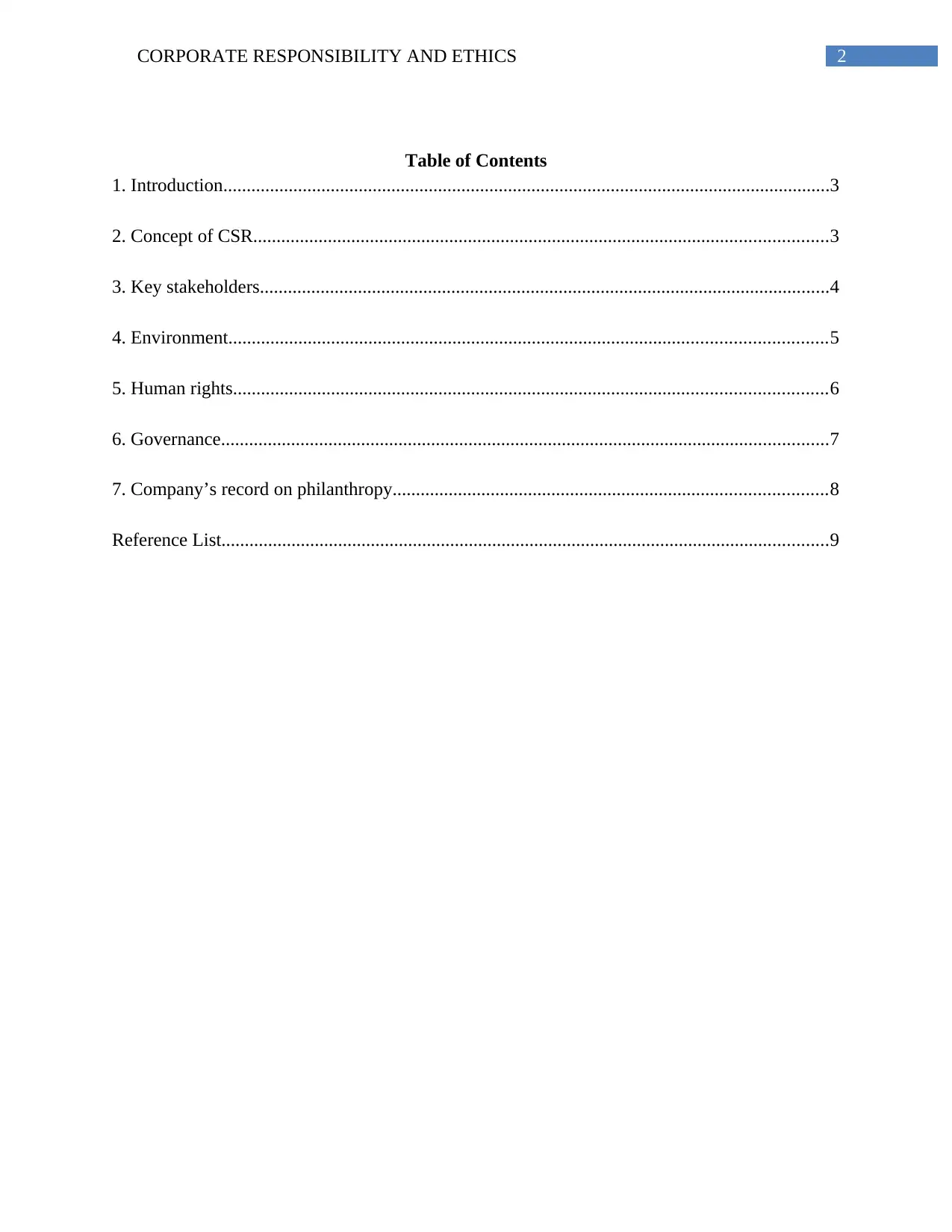
2CORPORATE RESPONSIBILITY AND ETHICS
Table of Contents
1. Introduction..................................................................................................................................3
2. Concept of CSR...........................................................................................................................3
3. Key stakeholders..........................................................................................................................4
4. Environment................................................................................................................................5
5. Human rights...............................................................................................................................6
6. Governance..................................................................................................................................7
7. Company’s record on philanthropy.............................................................................................8
Reference List..................................................................................................................................9
Table of Contents
1. Introduction..................................................................................................................................3
2. Concept of CSR...........................................................................................................................3
3. Key stakeholders..........................................................................................................................4
4. Environment................................................................................................................................5
5. Human rights...............................................................................................................................6
6. Governance..................................................................................................................................7
7. Company’s record on philanthropy.............................................................................................8
Reference List..................................................................................................................................9
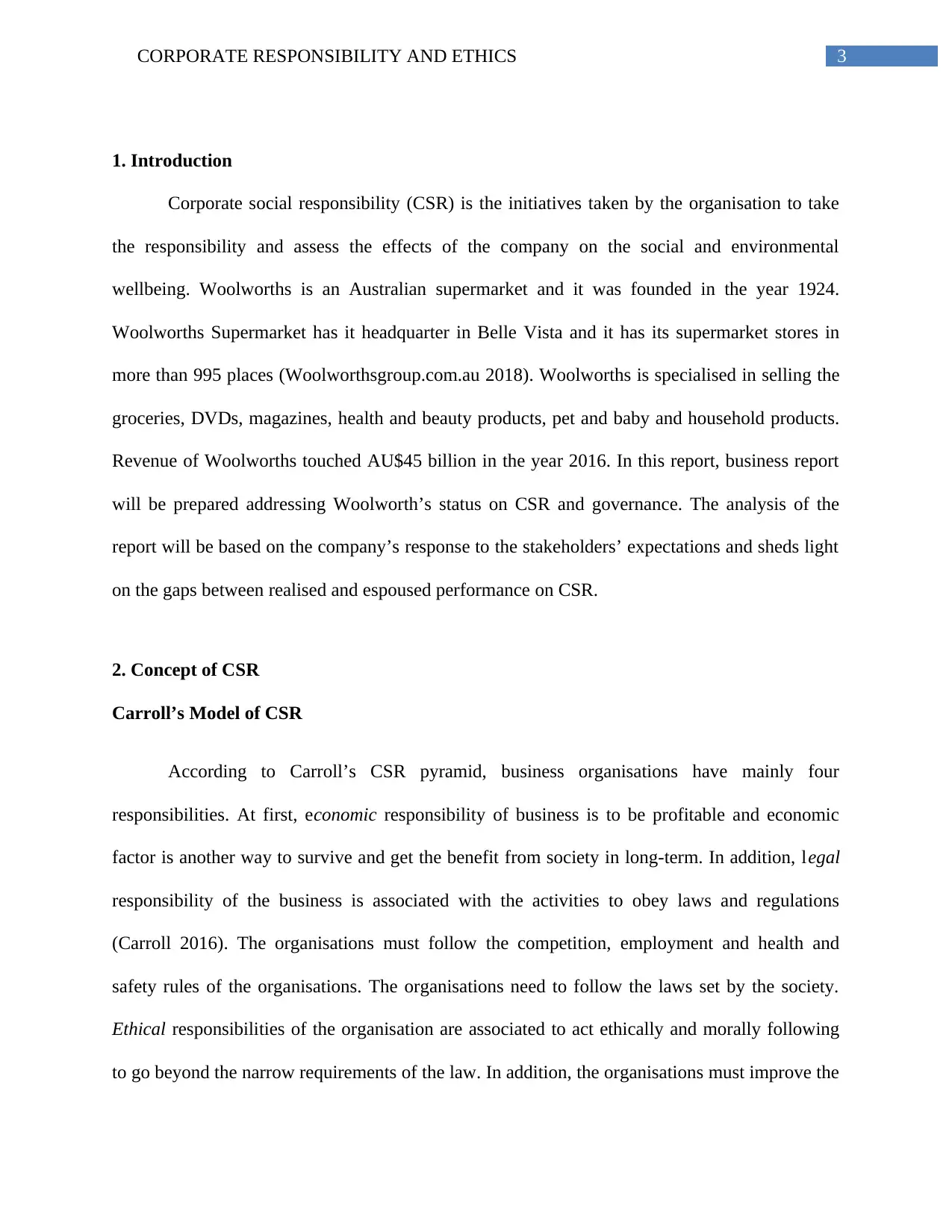
3CORPORATE RESPONSIBILITY AND ETHICS
1. Introduction
Corporate social responsibility (CSR) is the initiatives taken by the organisation to take
the responsibility and assess the effects of the company on the social and environmental
wellbeing. Woolworths is an Australian supermarket and it was founded in the year 1924.
Woolworths Supermarket has it headquarter in Belle Vista and it has its supermarket stores in
more than 995 places (Woolworthsgroup.com.au 2018). Woolworths is specialised in selling the
groceries, DVDs, magazines, health and beauty products, pet and baby and household products.
Revenue of Woolworths touched AU$45 billion in the year 2016. In this report, business report
will be prepared addressing Woolworth’s status on CSR and governance. The analysis of the
report will be based on the company’s response to the stakeholders’ expectations and sheds light
on the gaps between realised and espoused performance on CSR.
2. Concept of CSR
Carroll’s Model of CSR
According to Carroll’s CSR pyramid, business organisations have mainly four
responsibilities. At first, economic responsibility of business is to be profitable and economic
factor is another way to survive and get the benefit from society in long-term. In addition, legal
responsibility of the business is associated with the activities to obey laws and regulations
(Carroll 2016). The organisations must follow the competition, employment and health and
safety rules of the organisations. The organisations need to follow the laws set by the society.
Ethical responsibilities of the organisation are associated to act ethically and morally following
to go beyond the narrow requirements of the law. In addition, the organisations must improve the
1. Introduction
Corporate social responsibility (CSR) is the initiatives taken by the organisation to take
the responsibility and assess the effects of the company on the social and environmental
wellbeing. Woolworths is an Australian supermarket and it was founded in the year 1924.
Woolworths Supermarket has it headquarter in Belle Vista and it has its supermarket stores in
more than 995 places (Woolworthsgroup.com.au 2018). Woolworths is specialised in selling the
groceries, DVDs, magazines, health and beauty products, pet and baby and household products.
Revenue of Woolworths touched AU$45 billion in the year 2016. In this report, business report
will be prepared addressing Woolworth’s status on CSR and governance. The analysis of the
report will be based on the company’s response to the stakeholders’ expectations and sheds light
on the gaps between realised and espoused performance on CSR.
2. Concept of CSR
Carroll’s Model of CSR
According to Carroll’s CSR pyramid, business organisations have mainly four
responsibilities. At first, economic responsibility of business is to be profitable and economic
factor is another way to survive and get the benefit from society in long-term. In addition, legal
responsibility of the business is associated with the activities to obey laws and regulations
(Carroll 2016). The organisations must follow the competition, employment and health and
safety rules of the organisations. The organisations need to follow the laws set by the society.
Ethical responsibilities of the organisation are associated to act ethically and morally following
to go beyond the narrow requirements of the law. In addition, the organisations must improve the
Secure Best Marks with AI Grader
Need help grading? Try our AI Grader for instant feedback on your assignments.
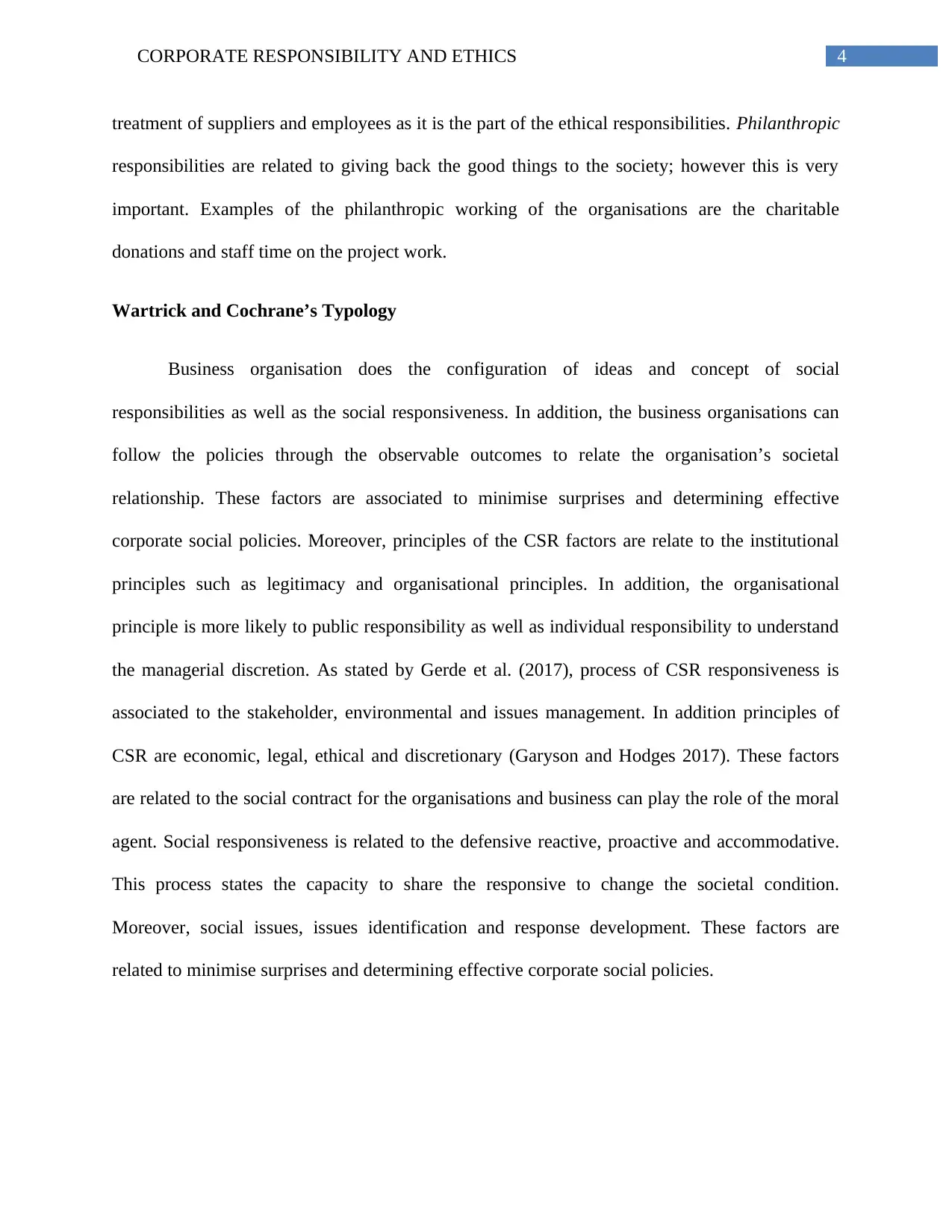
4CORPORATE RESPONSIBILITY AND ETHICS
treatment of suppliers and employees as it is the part of the ethical responsibilities. Philanthropic
responsibilities are related to giving back the good things to the society; however this is very
important. Examples of the philanthropic working of the organisations are the charitable
donations and staff time on the project work.
Wartrick and Cochrane’s Typology
Business organisation does the configuration of ideas and concept of social
responsibilities as well as the social responsiveness. In addition, the business organisations can
follow the policies through the observable outcomes to relate the organisation’s societal
relationship. These factors are associated to minimise surprises and determining effective
corporate social policies. Moreover, principles of the CSR factors are relate to the institutional
principles such as legitimacy and organisational principles. In addition, the organisational
principle is more likely to public responsibility as well as individual responsibility to understand
the managerial discretion. As stated by Gerde et al. (2017), process of CSR responsiveness is
associated to the stakeholder, environmental and issues management. In addition principles of
CSR are economic, legal, ethical and discretionary (Garyson and Hodges 2017). These factors
are related to the social contract for the organisations and business can play the role of the moral
agent. Social responsiveness is related to the defensive reactive, proactive and accommodative.
This process states the capacity to share the responsive to change the societal condition.
Moreover, social issues, issues identification and response development. These factors are
related to minimise surprises and determining effective corporate social policies.
treatment of suppliers and employees as it is the part of the ethical responsibilities. Philanthropic
responsibilities are related to giving back the good things to the society; however this is very
important. Examples of the philanthropic working of the organisations are the charitable
donations and staff time on the project work.
Wartrick and Cochrane’s Typology
Business organisation does the configuration of ideas and concept of social
responsibilities as well as the social responsiveness. In addition, the business organisations can
follow the policies through the observable outcomes to relate the organisation’s societal
relationship. These factors are associated to minimise surprises and determining effective
corporate social policies. Moreover, principles of the CSR factors are relate to the institutional
principles such as legitimacy and organisational principles. In addition, the organisational
principle is more likely to public responsibility as well as individual responsibility to understand
the managerial discretion. As stated by Gerde et al. (2017), process of CSR responsiveness is
associated to the stakeholder, environmental and issues management. In addition principles of
CSR are economic, legal, ethical and discretionary (Garyson and Hodges 2017). These factors
are related to the social contract for the organisations and business can play the role of the moral
agent. Social responsiveness is related to the defensive reactive, proactive and accommodative.
This process states the capacity to share the responsive to change the societal condition.
Moreover, social issues, issues identification and response development. These factors are
related to minimise surprises and determining effective corporate social policies.
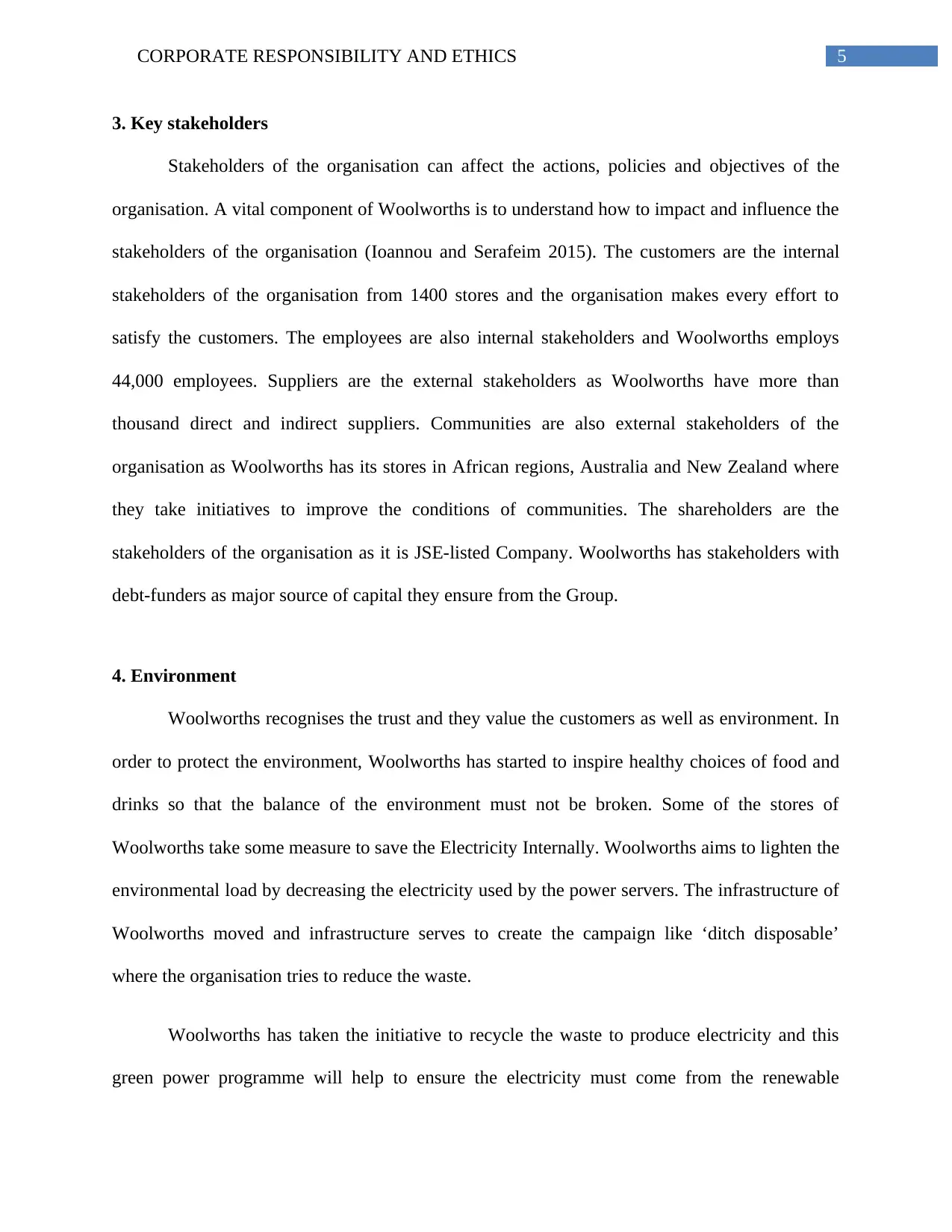
5CORPORATE RESPONSIBILITY AND ETHICS
3. Key stakeholders
Stakeholders of the organisation can affect the actions, policies and objectives of the
organisation. A vital component of Woolworths is to understand how to impact and influence the
stakeholders of the organisation (Ioannou and Serafeim 2015). The customers are the internal
stakeholders of the organisation from 1400 stores and the organisation makes every effort to
satisfy the customers. The employees are also internal stakeholders and Woolworths employs
44,000 employees. Suppliers are the external stakeholders as Woolworths have more than
thousand direct and indirect suppliers. Communities are also external stakeholders of the
organisation as Woolworths has its stores in African regions, Australia and New Zealand where
they take initiatives to improve the conditions of communities. The shareholders are the
stakeholders of the organisation as it is JSE-listed Company. Woolworths has stakeholders with
debt-funders as major source of capital they ensure from the Group.
4. Environment
Woolworths recognises the trust and they value the customers as well as environment. In
order to protect the environment, Woolworths has started to inspire healthy choices of food and
drinks so that the balance of the environment must not be broken. Some of the stores of
Woolworths take some measure to save the Electricity Internally. Woolworths aims to lighten the
environmental load by decreasing the electricity used by the power servers. The infrastructure of
Woolworths moved and infrastructure serves to create the campaign like ‘ditch disposable’
where the organisation tries to reduce the waste.
Woolworths has taken the initiative to recycle the waste to produce electricity and this
green power programme will help to ensure the electricity must come from the renewable
3. Key stakeholders
Stakeholders of the organisation can affect the actions, policies and objectives of the
organisation. A vital component of Woolworths is to understand how to impact and influence the
stakeholders of the organisation (Ioannou and Serafeim 2015). The customers are the internal
stakeholders of the organisation from 1400 stores and the organisation makes every effort to
satisfy the customers. The employees are also internal stakeholders and Woolworths employs
44,000 employees. Suppliers are the external stakeholders as Woolworths have more than
thousand direct and indirect suppliers. Communities are also external stakeholders of the
organisation as Woolworths has its stores in African regions, Australia and New Zealand where
they take initiatives to improve the conditions of communities. The shareholders are the
stakeholders of the organisation as it is JSE-listed Company. Woolworths has stakeholders with
debt-funders as major source of capital they ensure from the Group.
4. Environment
Woolworths recognises the trust and they value the customers as well as environment. In
order to protect the environment, Woolworths has started to inspire healthy choices of food and
drinks so that the balance of the environment must not be broken. Some of the stores of
Woolworths take some measure to save the Electricity Internally. Woolworths aims to lighten the
environmental load by decreasing the electricity used by the power servers. The infrastructure of
Woolworths moved and infrastructure serves to create the campaign like ‘ditch disposable’
where the organisation tries to reduce the waste.
Woolworths has taken the initiative to recycle the waste to produce electricity and this
green power programme will help to ensure the electricity must come from the renewable
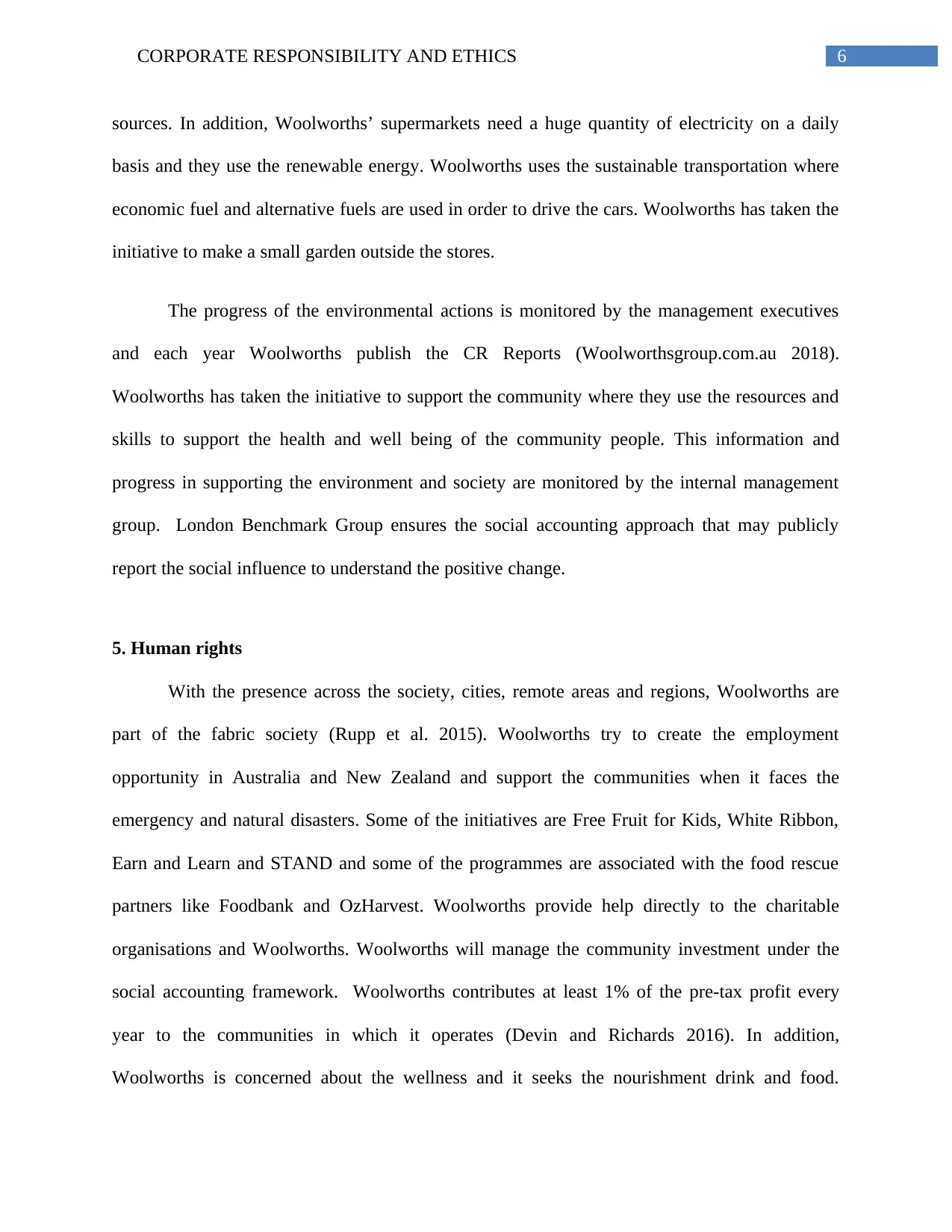
6CORPORATE RESPONSIBILITY AND ETHICS
sources. In addition, Woolworths’ supermarkets need a huge quantity of electricity on a daily
basis and they use the renewable energy. Woolworths uses the sustainable transportation where
economic fuel and alternative fuels are used in order to drive the cars. Woolworths has taken the
initiative to make a small garden outside the stores.
The progress of the environmental actions is monitored by the management executives
and each year Woolworths publish the CR Reports (Woolworthsgroup.com.au 2018).
Woolworths has taken the initiative to support the community where they use the resources and
skills to support the health and well being of the community people. This information and
progress in supporting the environment and society are monitored by the internal management
group. London Benchmark Group ensures the social accounting approach that may publicly
report the social influence to understand the positive change.
5. Human rights
With the presence across the society, cities, remote areas and regions, Woolworths are
part of the fabric society (Rupp et al. 2015). Woolworths try to create the employment
opportunity in Australia and New Zealand and support the communities when it faces the
emergency and natural disasters. Some of the initiatives are Free Fruit for Kids, White Ribbon,
Earn and Learn and STAND and some of the programmes are associated with the food rescue
partners like Foodbank and OzHarvest. Woolworths provide help directly to the charitable
organisations and Woolworths. Woolworths will manage the community investment under the
social accounting framework. Woolworths contributes at least 1% of the pre-tax profit every
year to the communities in which it operates (Devin and Richards 2016). In addition,
Woolworths is concerned about the wellness and it seeks the nourishment drink and food.
sources. In addition, Woolworths’ supermarkets need a huge quantity of electricity on a daily
basis and they use the renewable energy. Woolworths uses the sustainable transportation where
economic fuel and alternative fuels are used in order to drive the cars. Woolworths has taken the
initiative to make a small garden outside the stores.
The progress of the environmental actions is monitored by the management executives
and each year Woolworths publish the CR Reports (Woolworthsgroup.com.au 2018).
Woolworths has taken the initiative to support the community where they use the resources and
skills to support the health and well being of the community people. This information and
progress in supporting the environment and society are monitored by the internal management
group. London Benchmark Group ensures the social accounting approach that may publicly
report the social influence to understand the positive change.
5. Human rights
With the presence across the society, cities, remote areas and regions, Woolworths are
part of the fabric society (Rupp et al. 2015). Woolworths try to create the employment
opportunity in Australia and New Zealand and support the communities when it faces the
emergency and natural disasters. Some of the initiatives are Free Fruit for Kids, White Ribbon,
Earn and Learn and STAND and some of the programmes are associated with the food rescue
partners like Foodbank and OzHarvest. Woolworths provide help directly to the charitable
organisations and Woolworths. Woolworths will manage the community investment under the
social accounting framework. Woolworths contributes at least 1% of the pre-tax profit every
year to the communities in which it operates (Devin and Richards 2016). In addition,
Woolworths is concerned about the wellness and it seeks the nourishment drink and food.
Paraphrase This Document
Need a fresh take? Get an instant paraphrase of this document with our AI Paraphraser
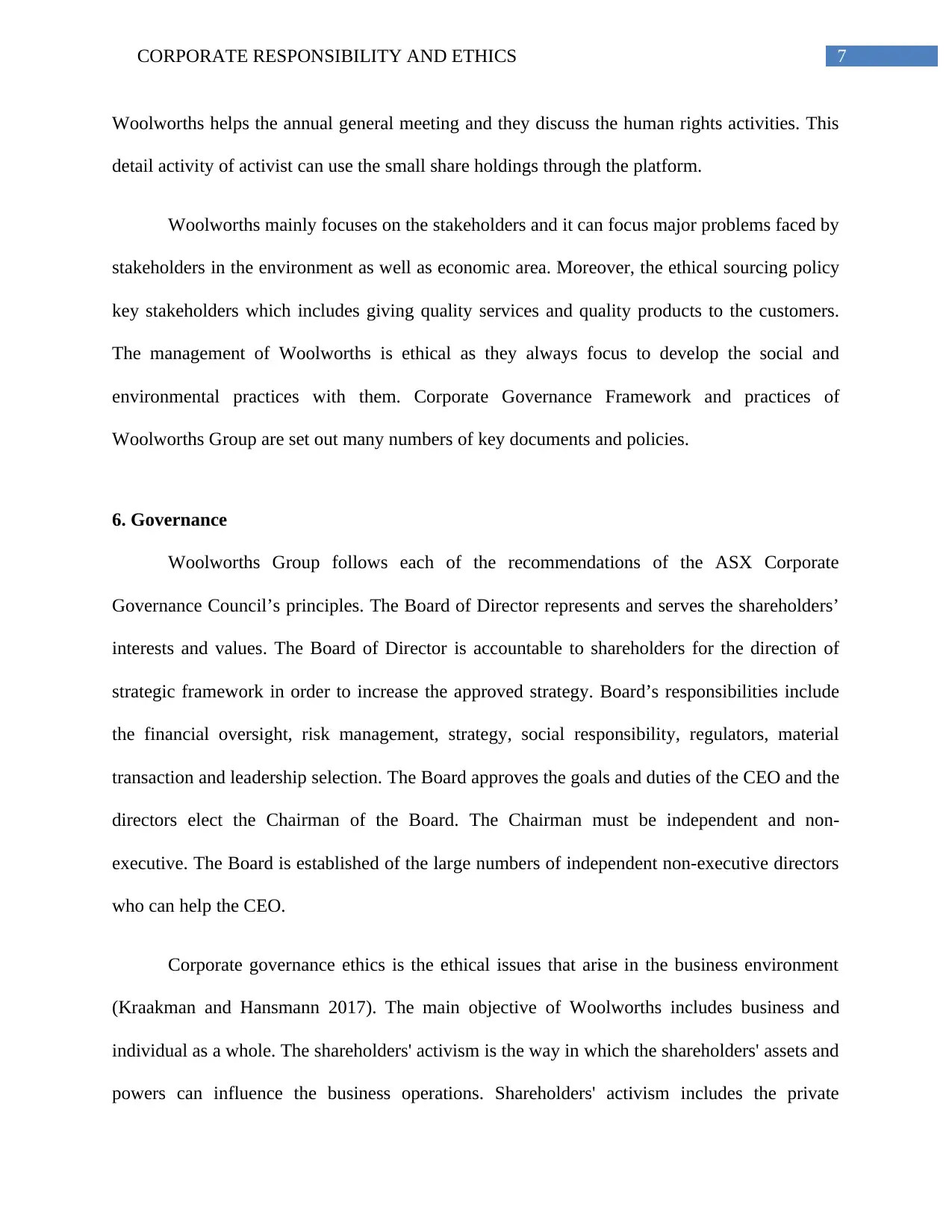
7CORPORATE RESPONSIBILITY AND ETHICS
Woolworths helps the annual general meeting and they discuss the human rights activities. This
detail activity of activist can use the small share holdings through the platform.
Woolworths mainly focuses on the stakeholders and it can focus major problems faced by
stakeholders in the environment as well as economic area. Moreover, the ethical sourcing policy
key stakeholders which includes giving quality services and quality products to the customers.
The management of Woolworths is ethical as they always focus to develop the social and
environmental practices with them. Corporate Governance Framework and practices of
Woolworths Group are set out many numbers of key documents and policies.
6. Governance
Woolworths Group follows each of the recommendations of the ASX Corporate
Governance Council’s principles. The Board of Director represents and serves the shareholders’
interests and values. The Board of Director is accountable to shareholders for the direction of
strategic framework in order to increase the approved strategy. Board’s responsibilities include
the financial oversight, risk management, strategy, social responsibility, regulators, material
transaction and leadership selection. The Board approves the goals and duties of the CEO and the
directors elect the Chairman of the Board. The Chairman must be independent and non-
executive. The Board is established of the large numbers of independent non-executive directors
who can help the CEO.
Corporate governance ethics is the ethical issues that arise in the business environment
(Kraakman and Hansmann 2017). The main objective of Woolworths includes business and
individual as a whole. The shareholders' activism is the way in which the shareholders' assets and
powers can influence the business operations. Shareholders' activism includes the private
Woolworths helps the annual general meeting and they discuss the human rights activities. This
detail activity of activist can use the small share holdings through the platform.
Woolworths mainly focuses on the stakeholders and it can focus major problems faced by
stakeholders in the environment as well as economic area. Moreover, the ethical sourcing policy
key stakeholders which includes giving quality services and quality products to the customers.
The management of Woolworths is ethical as they always focus to develop the social and
environmental practices with them. Corporate Governance Framework and practices of
Woolworths Group are set out many numbers of key documents and policies.
6. Governance
Woolworths Group follows each of the recommendations of the ASX Corporate
Governance Council’s principles. The Board of Director represents and serves the shareholders’
interests and values. The Board of Director is accountable to shareholders for the direction of
strategic framework in order to increase the approved strategy. Board’s responsibilities include
the financial oversight, risk management, strategy, social responsibility, regulators, material
transaction and leadership selection. The Board approves the goals and duties of the CEO and the
directors elect the Chairman of the Board. The Chairman must be independent and non-
executive. The Board is established of the large numbers of independent non-executive directors
who can help the CEO.
Corporate governance ethics is the ethical issues that arise in the business environment
(Kraakman and Hansmann 2017). The main objective of Woolworths includes business and
individual as a whole. The shareholders' activism is the way in which the shareholders' assets and
powers can influence the business operations. Shareholders' activism includes the private
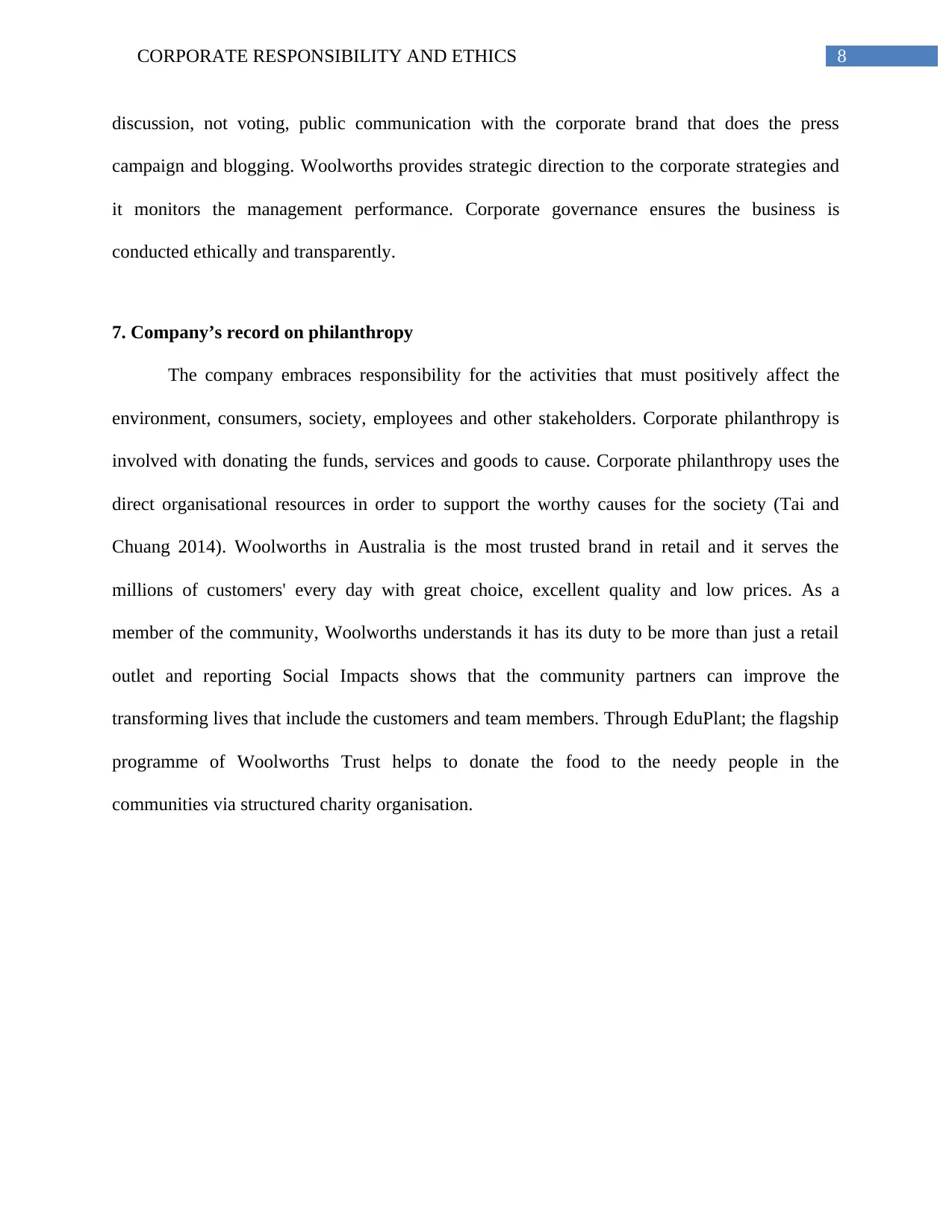
8CORPORATE RESPONSIBILITY AND ETHICS
discussion, not voting, public communication with the corporate brand that does the press
campaign and blogging. Woolworths provides strategic direction to the corporate strategies and
it monitors the management performance. Corporate governance ensures the business is
conducted ethically and transparently.
7. Company’s record on philanthropy
The company embraces responsibility for the activities that must positively affect the
environment, consumers, society, employees and other stakeholders. Corporate philanthropy is
involved with donating the funds, services and goods to cause. Corporate philanthropy uses the
direct organisational resources in order to support the worthy causes for the society (Tai and
Chuang 2014). Woolworths in Australia is the most trusted brand in retail and it serves the
millions of customers' every day with great choice, excellent quality and low prices. As a
member of the community, Woolworths understands it has its duty to be more than just a retail
outlet and reporting Social Impacts shows that the community partners can improve the
transforming lives that include the customers and team members. Through EduPlant; the flagship
programme of Woolworths Trust helps to donate the food to the needy people in the
communities via structured charity organisation.
discussion, not voting, public communication with the corporate brand that does the press
campaign and blogging. Woolworths provides strategic direction to the corporate strategies and
it monitors the management performance. Corporate governance ensures the business is
conducted ethically and transparently.
7. Company’s record on philanthropy
The company embraces responsibility for the activities that must positively affect the
environment, consumers, society, employees and other stakeholders. Corporate philanthropy is
involved with donating the funds, services and goods to cause. Corporate philanthropy uses the
direct organisational resources in order to support the worthy causes for the society (Tai and
Chuang 2014). Woolworths in Australia is the most trusted brand in retail and it serves the
millions of customers' every day with great choice, excellent quality and low prices. As a
member of the community, Woolworths understands it has its duty to be more than just a retail
outlet and reporting Social Impacts shows that the community partners can improve the
transforming lives that include the customers and team members. Through EduPlant; the flagship
programme of Woolworths Trust helps to donate the food to the needy people in the
communities via structured charity organisation.
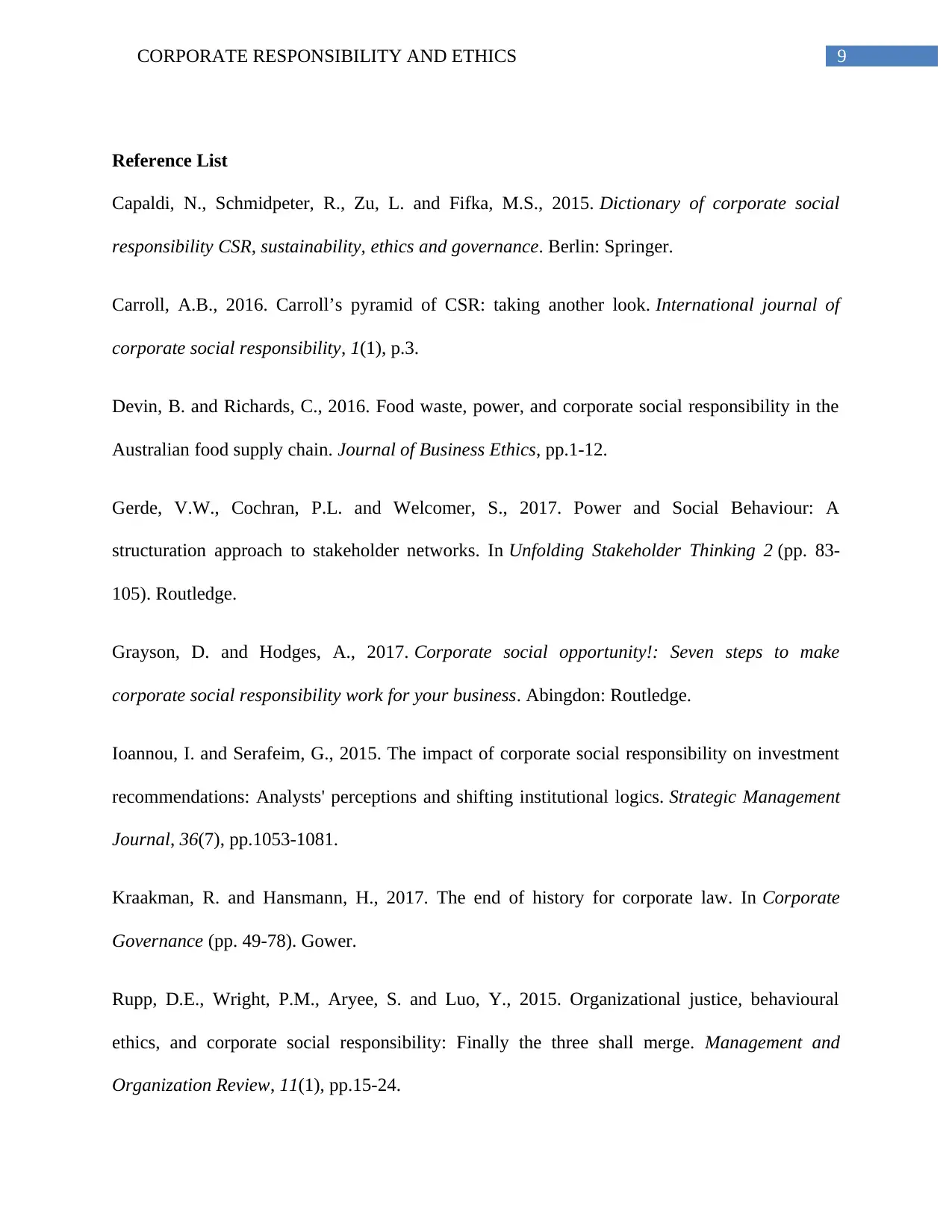
9CORPORATE RESPONSIBILITY AND ETHICS
Reference List
Capaldi, N., Schmidpeter, R., Zu, L. and Fifka, M.S., 2015. Dictionary of corporate social
responsibility CSR, sustainability, ethics and governance. Berlin: Springer.
Carroll, A.B., 2016. Carroll’s pyramid of CSR: taking another look. International journal of
corporate social responsibility, 1(1), p.3.
Devin, B. and Richards, C., 2016. Food waste, power, and corporate social responsibility in the
Australian food supply chain. Journal of Business Ethics, pp.1-12.
Gerde, V.W., Cochran, P.L. and Welcomer, S., 2017. Power and Social Behaviour: A
structuration approach to stakeholder networks. In Unfolding Stakeholder Thinking 2 (pp. 83-
105). Routledge.
Grayson, D. and Hodges, A., 2017. Corporate social opportunity!: Seven steps to make
corporate social responsibility work for your business. Abingdon: Routledge.
Ioannou, I. and Serafeim, G., 2015. The impact of corporate social responsibility on investment
recommendations: Analysts' perceptions and shifting institutional logics. Strategic Management
Journal, 36(7), pp.1053-1081.
Kraakman, R. and Hansmann, H., 2017. The end of history for corporate law. In Corporate
Governance (pp. 49-78). Gower.
Rupp, D.E., Wright, P.M., Aryee, S. and Luo, Y., 2015. Organizational justice, behavioural
ethics, and corporate social responsibility: Finally the three shall merge. Management and
Organization Review, 11(1), pp.15-24.
Reference List
Capaldi, N., Schmidpeter, R., Zu, L. and Fifka, M.S., 2015. Dictionary of corporate social
responsibility CSR, sustainability, ethics and governance. Berlin: Springer.
Carroll, A.B., 2016. Carroll’s pyramid of CSR: taking another look. International journal of
corporate social responsibility, 1(1), p.3.
Devin, B. and Richards, C., 2016. Food waste, power, and corporate social responsibility in the
Australian food supply chain. Journal of Business Ethics, pp.1-12.
Gerde, V.W., Cochran, P.L. and Welcomer, S., 2017. Power and Social Behaviour: A
structuration approach to stakeholder networks. In Unfolding Stakeholder Thinking 2 (pp. 83-
105). Routledge.
Grayson, D. and Hodges, A., 2017. Corporate social opportunity!: Seven steps to make
corporate social responsibility work for your business. Abingdon: Routledge.
Ioannou, I. and Serafeim, G., 2015. The impact of corporate social responsibility on investment
recommendations: Analysts' perceptions and shifting institutional logics. Strategic Management
Journal, 36(7), pp.1053-1081.
Kraakman, R. and Hansmann, H., 2017. The end of history for corporate law. In Corporate
Governance (pp. 49-78). Gower.
Rupp, D.E., Wright, P.M., Aryee, S. and Luo, Y., 2015. Organizational justice, behavioural
ethics, and corporate social responsibility: Finally the three shall merge. Management and
Organization Review, 11(1), pp.15-24.
Secure Best Marks with AI Grader
Need help grading? Try our AI Grader for instant feedback on your assignments.
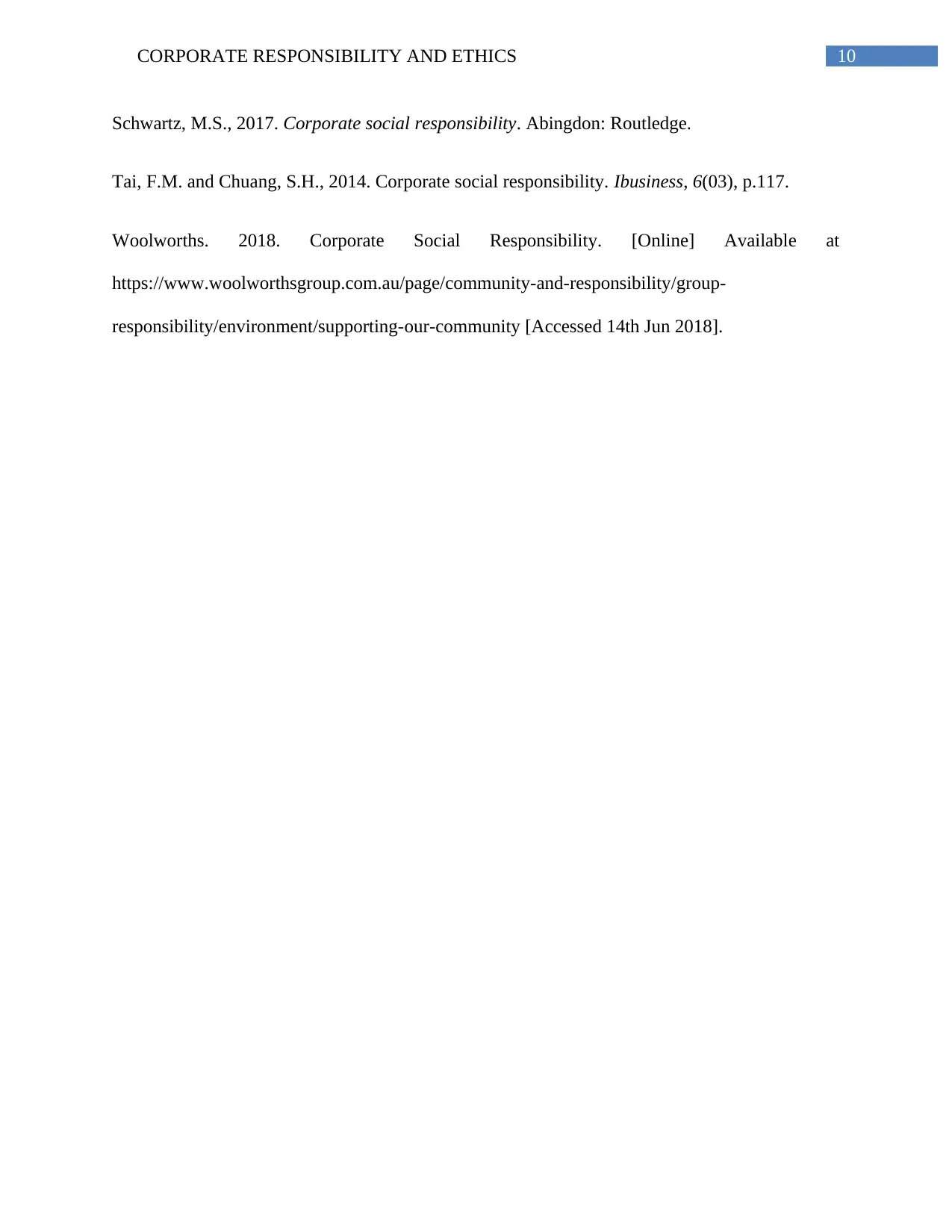
10CORPORATE RESPONSIBILITY AND ETHICS
Schwartz, M.S., 2017. Corporate social responsibility. Abingdon: Routledge.
Tai, F.M. and Chuang, S.H., 2014. Corporate social responsibility. Ibusiness, 6(03), p.117.
Woolworths. 2018. Corporate Social Responsibility. [Online] Available at
https://www.woolworthsgroup.com.au/page/community-and-responsibility/group-
responsibility/environment/supporting-our-community [Accessed 14th Jun 2018].
Schwartz, M.S., 2017. Corporate social responsibility. Abingdon: Routledge.
Tai, F.M. and Chuang, S.H., 2014. Corporate social responsibility. Ibusiness, 6(03), p.117.
Woolworths. 2018. Corporate Social Responsibility. [Online] Available at
https://www.woolworthsgroup.com.au/page/community-and-responsibility/group-
responsibility/environment/supporting-our-community [Accessed 14th Jun 2018].
1 out of 11
Related Documents
Your All-in-One AI-Powered Toolkit for Academic Success.
+13062052269
info@desklib.com
Available 24*7 on WhatsApp / Email
![[object Object]](/_next/static/media/star-bottom.7253800d.svg)
Unlock your academic potential
© 2024 | Zucol Services PVT LTD | All rights reserved.





